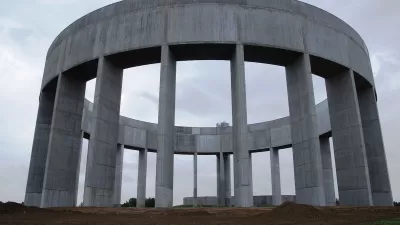What would Richard Neutra do with a third arm? UC Berkeley researchers once asked him that and more, for science.
A recent episode of design podcast 99% Invisible unearthed the records of a 1950s study that aimed to discover the roots of creativity.
The Institute of Personality and Research brought together 40 of the period's most prestigious architects, who, over several weekend retreats in Berkeley, were observed taking tests, performing tasks, and answering all manner of questions (what would be the best place for a third arm? How can architects balance creative vision with clients’ demands?).
Though many types of creative professionals were surveyed, architects were seen as uniquely situated to answer the question of what makes people creative:
Researchers saw architects as people working at a crossroads of creative disciplines, a combination of analytic and artistic creativity. As professionals, architects had to be savvy as engineers and businessmen; as aesthetes, they also acted as designers and artists.
The episode features snippets of conversations among some of the top architects of the period. Plus, the podcast notes, "what IPAR learned helped transform the way people think about creativity today."
Head to 99% Invisible for pictures and artifacts, like the center's original invitation list, signed guestbook, and mosaics by participants (including Richard Neutra) juxtaposed with images of their famous buildings.
FULL STORY: The Mind of An Architect

Planetizen Federal Action Tracker
A weekly monitor of how Trump’s orders and actions are impacting planners and planning in America.

Restaurant Patios Were a Pandemic Win — Why Were They so Hard to Keep?
Social distancing requirements and changes in travel patterns prompted cities to pilot new uses for street and sidewalk space. Then it got complicated.

Map: Where Senate Republicans Want to Sell Your Public Lands
For public land advocates, the Senate Republicans’ proposal to sell millions of acres of public land in the West is “the biggest fight of their careers.”

Maui's Vacation Rental Debate Turns Ugly
Verbal attacks, misinformation campaigns and fistfights plague a high-stakes debate to convert thousands of vacation rentals into long-term housing.

San Francisco Suspends Traffic Calming Amidst Record Deaths
Citing “a challenging fiscal landscape,” the city will cease the program on the heels of 42 traffic deaths, including 24 pedestrians.

California Homeless Arrests, Citations Spike After Ruling
An investigation reveals that anti-homeless actions increased up to 500% after Grants Pass v. Johnson — even in cities claiming no policy change.
Urban Design for Planners 1: Software Tools
This six-course series explores essential urban design concepts using open source software and equips planners with the tools they need to participate fully in the urban design process.
Planning for Universal Design
Learn the tools for implementing Universal Design in planning regulations.
Heyer Gruel & Associates PA
JM Goldson LLC
Custer County Colorado
City of Camden Redevelopment Agency
City of Astoria
Transportation Research & Education Center (TREC) at Portland State University
Camden Redevelopment Agency
City of Claremont
Municipality of Princeton (NJ)





























